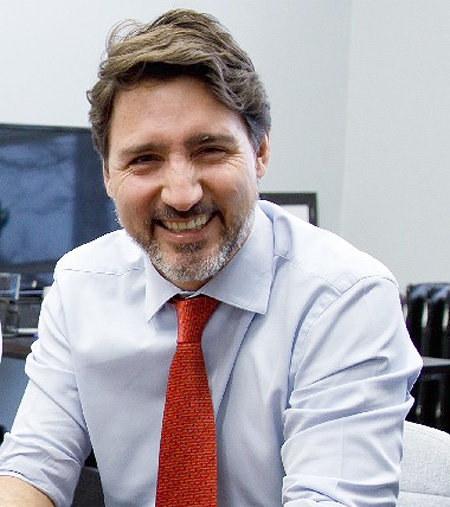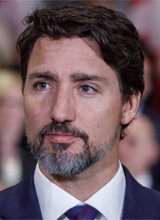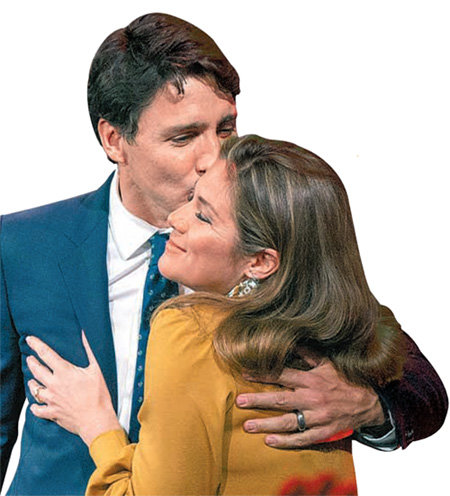Interview Questionnaire for Justin Trudeau, Prime Minister of Canada
Interview Questionnaire for Justin Trudeau, Prime Minister of Canada
Posted April. 07, 2020 10:12,
Updated April. 07, 2020 10:15


Canadian Prime Minister Justin Trudeau is amongst an emerging young generation of world leaders. His remarkable rise to Canada’s highest elected office hasdrawnconsiderable attention from political circles aroundthe globe. In 2015, Trudeau led the Liberal Party of Canada – the oldest political party in the country – to a resounding majority victory. He was only 44-years-old.
“I took on this political adventure as I believe in a better future and prosperity of the country,” Prime Minister Trudeau said in an e-mail interview with The Dong-A Ilbo to celebrate the newspaper’s 100th anniversary. “We cannot predict what the future will look like and sometimes we face crises like COVID-19, but you have to learn to deal with uncertainty as a prime minister.”
In regards to the various responses countries are takingto contain the coronavirus, the Prime Minister said that “South Korea’s effective quarantine measures are outstanding examples for the world. We must work together to find solutions for the virus.”
Prime Minister Justin Trudeau who is leading Canada, one of the G7 countries, has a dynamic personality. A significant number of about 9,000 photographs shared by the Canadian prime minister's office feature him with a loose tie or rolled-up sleeves engaging with the public. Such “young charisma” is what makes people anticipate for his future performance as a global leader. This is the first time the Prime Minister has done an interview with a South Korean media outlet.
“I cannot say it has always been easy to govern. However, the Canadian citizens’ openness, resilience, and diversity motivates me to keep going, even in the most difficult times,” the Prime Minister said. His goal as the leader of Canada is to create a more prosperous future, for every citizen to enjoy opportunities for success. “We will continuously strengthen economic relations with South Korea through trade and investment while developing a partnership with the country in research and innovation,” he added.

The answer to each question is as follows:
―As COVID-19 (coronavirus) is rapidly spreading all over the world, there have been rising cases of infection within Canada. How is the Canadian government responding to the outbreak?
“Our Government is working closely with local, provincial, territorial, and international partners to minimize its health, economic, and social impacts in Canada and around the world. I personally spoke with many world leaders, including President Moon, on the need for a coordinated international response to change the trajectory of the disease. During our call on March 25th, President Moon and I spoke of the need to have a strong science based medical response. We also spoke about the need to act collectively to support countries with weaker health, financial and economic systems.
“President Moon and I agreed on the urgent priority of vaccine development and treatments, and on the importance of sharing health research and scientific data with the international community so that all countries could learn from the experiences of others.”
―Koreans have been fighting hard against COVID-19, as the total number of confirmed cases has surged in the past few weeks. Do you have any words of encouragement for the Republic of Korea, and the Korean people?
“COVID-19 is a global issue that has impacts across the world. We have to work together to find solutions to fight this virus. The Republic of Korea is an ally for Canada and I commend President Moon and the Korean people for their steadfast and diligent campaign against COVID-19, which has resulted in several weeks of fewer and fewer new cases. Koreans have shown how to respond effectively to the virus, and people around the world are holding up the Korean example as a model.”
―This year marks the 5th anniversary of the Canada-ROK Free Trade Agreement (FTA). How do you see the future economic prospects of our bilateral trade?
“The Canada-ROK FTA strengthened the special bonds among the people in both countries. It also promoted regional integration in the Asia-Pacific region and created jobs and opportunities for Canadians in every region of the country. The ROK is a major economic player in its own right and a key market for Canada. Being well positioned in this region is central to Canada’s long-term economic prosperity and we will continue to strengthen economic ties, particularly through trade and investment, between the two countries.”
―This coming June 2020 will mark the 70th anniversary of the Korean War. Canada assisted the ROK by sending troops to the Korean Peninsula. How do you want to further develop the special Canada-ROK security relationship, including North Korea's denuclearization issue?
“We remain gravely concerned by North Korea’s weapons of mass destruction and ballistic missile programs. So our Government will continue to work with international partners on advancing this issue. We want to continue working with the Republic of Korea on security, including regional issues on the Korean Peninsula.”
―Every year, approximately 17,000 Korean students come to Canada, and there are currently over 24,000 Koreans completing their studies in Canada. Given the social and cultural exchanges between the two countries, do you have any particular views or opinions regarding Canada’s social and cultural cooperation with the ROK?
“Canada and the ROK share strong people-to-people linkages, which are enhanced by increasing immigration and tourism flows, as well as student exchanges. With over 200,000 Canadians of Korean descent across our country, the vibrant Korean-Canadian community’s contributions to our country are very substantial in several areas, including science, law or culture. I know Koreans take great pride in the film ‘Parasite,’ and Canadians do as well for our small contribution. As you know, the movie star, Choi Woo-shik, grew up in British Columbia and we’re very proud to call him Canadian.”
―As Canada’s second youngest prime minister, what is the secret to remaining young in politics? And how have you’ve coped with all the challenges you’ve faced as leader?
“I began this political adventure ten years ago because I believed in a better future and in a more prosperous Canada. I cannot say it has always been easy to govern and we sometimes face crises, as it is currently the case with COVID-19. We cannot predict what the future will look like. For a prime minister, you have to learn to deal with uncertainty. But it is in the most difficult times that we see the best of Canadians. I see, every day, how hard Canadians work, how deeply the values of openness, resilience, and diversity are embedded in our principles. It motivates me to keep going, even in the most difficult times.”
―We’ve seen an emerging trend of young leaders in their 30s succeeding to high office. Why do you think voters want young leaders? Do you think that this is a“generational shift” in global politics, or simply a blip?
“In politics, we all have something to contribute, no matter our age. There are leaders of all ages across the world and we all work for the well-being of our citizens. In 2015, Canadians elected our party because they wanted a prime minister who works with the provincial premiers on creating good jobs, on ensuring a comfortable retirement for everyone, and on fighting climate change.”
―Your Cabinet is made up of MPs from a variety of regional and ethnic backgrounds; and it is gender balanced,with an equal number of men and women. What was your underlying vision behind this?
“One fifth of Canadians were born elsewhere and chose to immigrate to Canada. Vibrant, progressive, and diverse, our towns and cities have become windows to the world because of the people who have made them home. That is why we have a Cabinet that represents Canada’s rich cultural diversity. Our Government also believe that standing up for gender equality is a top priority. All of us benefit when women can participate freely, fully, and equally in our economies and society, and supporting and empowering women and girls must be at the heart of the decisions we make.”
―As Prime Minister, what are your short-term and long-term goals for Canada? What kind of efforts do you need to make in order for Canada to achieve these goals?
“In the years ahead, our team will work hard to build on the progress that we made. We will continue to help all Canadians, including youth, seniors, families and students. We will give a voice to the voiceless. And in every decision we make as a government, we will always put the country and its people first. For example, we will help the widow who has lost her partner after 48 years of common life. We will also help the mother with three children that needs a little bit more help at the end of the month. Our Government firmly believe that every Canadian deserves a real and fair chance to succeed and that is our goal.”
―On the 1st of April, this year, Dong-A Ilbo Daily will be celebrating its 100th anniversary. If you have any congratulatory message that you would like to convey, to the readers of Korea, please share it with us.
“I want to congratulate Dong-A Ilbo Daily for their 100thanniversary. Every day, you keep people informed about what is going on around the world. You are an essential source of information, and I want to commend you for covering 100 years of history. I wish you many more years of success.”
lightee@donga.com







